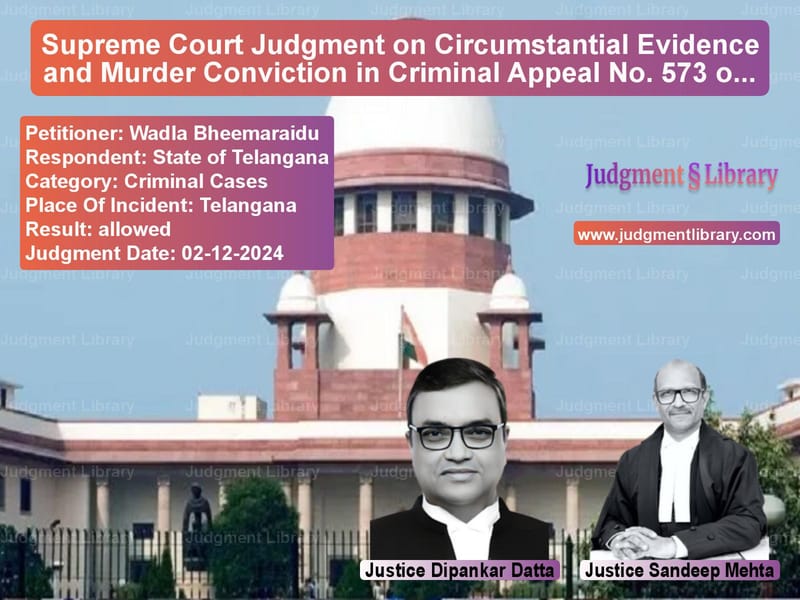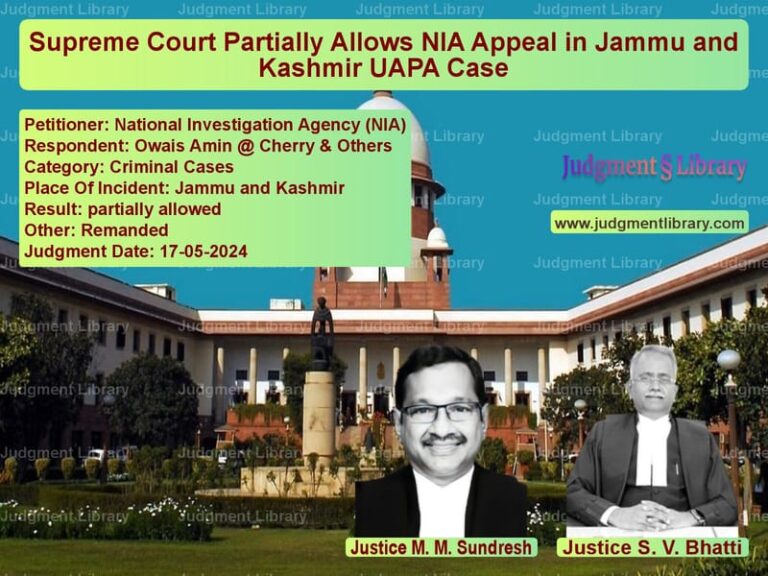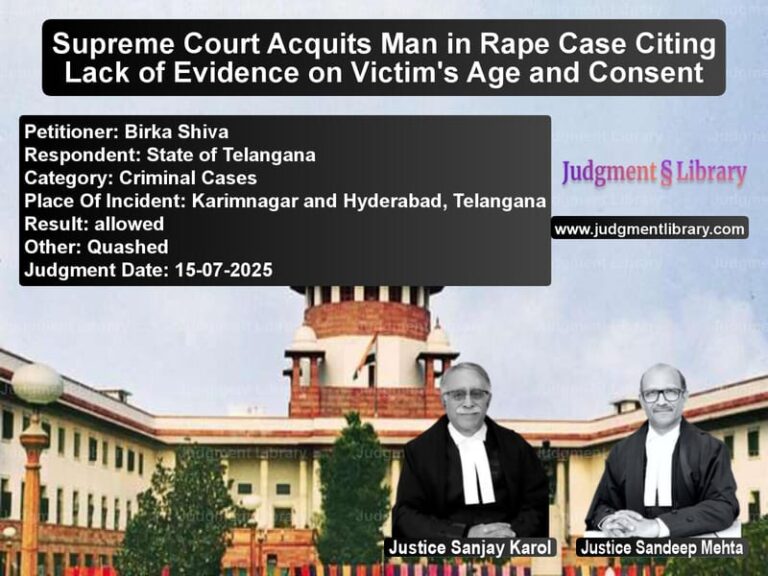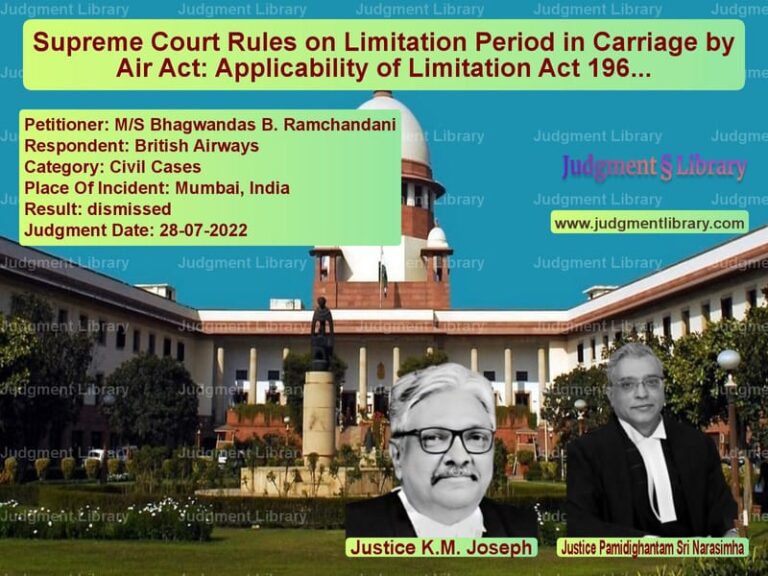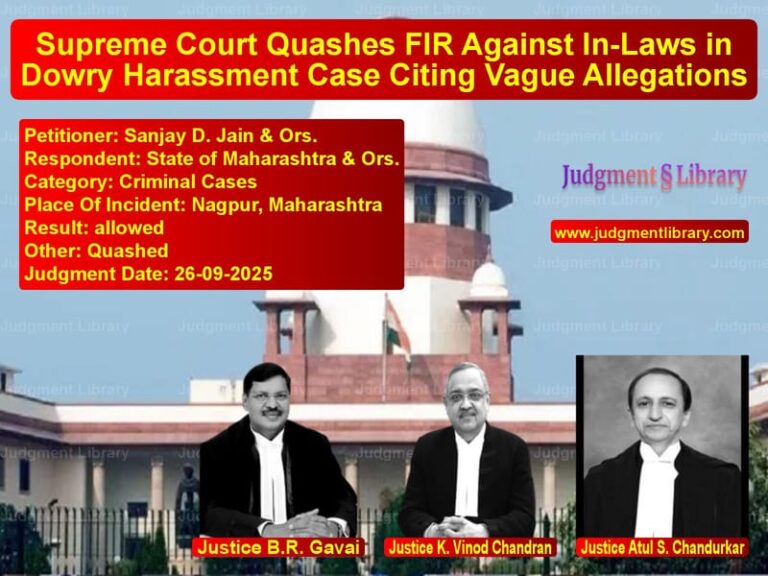Supreme Court Judgment on Circumstantial Evidence and Murder Conviction in Criminal Appeal No. 573 of 2023
The Supreme Court of India, in its ruling on December 3, 2024, delivered a judgment on Criminal Appeal No. 573 of 2023, which revolved around the application of circumstantial evidence in a murder trial. The case concerned the appellant, Wadla Bheemaraidu, who was convicted of the murder of K. Nagesh, along with co-accused persons, by the Family Court-cum-VII-Additional Sessions Judge, Mahabubnagar. The case highlighted the importance of establishing a clear chain of circumstantial evidence in order to prove guilt beyond a reasonable doubt.
The appellant, along with two other co-accused, was initially convicted for the crime under Sections 384, 364, 302, and 201 of the Indian Penal Code (IPC). The Division Bench of the Telangana High Court upheld the conviction of the appellant, while acquitting the co-accused. The appellant then filed an appeal to the Supreme Court, challenging the findings of the High Court.
Background of the Case
The tragic events unfolded when K. Nagesh, a resident of Thipraspally village, Telangana, became involved in an extramarital affair with the wife of the appellant, Smt. Shivaleela. The relationship was discovered, and a village panchayat was convened. During this time, the appellant and other accused allegedly threatened the family of K. Nagesh, demanding a monetary penalty for the affair. The appellant, dissatisfied with the compensation, planned to eliminate K. Nagesh.
On January 11, 2013, the appellant and his co-accused abducted K. Nagesh, strangled him, and crushed his face with a boulder to destroy his identity. The body was concealed in a nearby water channel, and the clothes were disposed of in the Krishna River. The prosecution’s case was built on the circumstantial evidence found at the crime scene, including skeletal remains and DNA profiling linking the remains to the deceased’s family.
The appellant was arrested based on a confession made to the police, which led to the recovery of the body. However, the appellant and the co-accused denied their involvement in the crime, leading to the filing of the appeal.
Legal Issues Raised
- Whether the prosecution successfully proved the guilt of the appellant beyond a reasonable doubt through circumstantial evidence.
- Whether the recovery of skeletal remains from the crime scene, based on the appellant’s confession, can be considered a valid link in establishing the appellant’s involvement in the crime.
- Whether the DNA profiling of the skeletal remains was sufficient to convict the appellant in the absence of direct eyewitness testimony.
Arguments Presented
Arguments by the Petitioner (Appellant, Wadla Bheemaraidu)
- The appellant argued that the prosecution’s case was based purely on circumstantial evidence, which had not been proved beyond a reasonable doubt. The chain of evidence, according to the appellant, was incomplete and failed to establish his guilt definitively.
- It was argued that the motive behind the murder was not sufficiently established by the prosecution, as neither the mother nor the father of the deceased supported the claims of an extramarital affair between the deceased and the appellant’s wife.
- Further, the appellant’s counsel contended that the confessional statement made by the appellant to the police was inadmissible under Section 27 of the Indian Evidence Act, as it lacked sufficient corroborative evidence.
- Additionally, the recovery of the skeletal remains could not be linked conclusively to the appellant, as the investigating officer did not properly establish the place of recovery or the appellant’s role in it.
Arguments by the Respondent (State of Telangana)
- The State argued that the circumstantial evidence was overwhelming and pointed unequivocally to the appellant’s guilt. The recovery of skeletal remains from the crime scene was made based on the appellant’s confession, which was admissible under Section 27 of the Indian Evidence Act.
- The State highlighted the appellant’s motive for committing the crime, based on the extramarital affair between the deceased and the appellant’s wife, which led to the planning and execution of the murder.
- Furthermore, the DNA profiling report, which matched the skeletal remains to the deceased’s family, was presented as conclusive evidence linking the appellant to the crime.
Supreme Court’s Observations
On Circumstantial Evidence
The Supreme Court reiterated the well-established principle that in cases based solely on circumstantial evidence, the prosecution must prove each link in the chain beyond reasonable doubt. The Court stated:
“In cases where the prosecution relies purely on circumstantial evidence, the evidence must be clear, cogent, and complete. Each circumstance must be proved beyond all manner of doubt, and the circumstances should point conclusively to the guilt of the accused, leaving no room for any other explanation.”
On the Confessional Statement and Recovery of Evidence
The Court analyzed the appellant’s confessional statement and its admissibility under Section 27 of the Indian Evidence Act. The Court noted:
“The disclosure statement made by the appellant to the police is admissible only to the extent that it leads to the discovery of facts. However, in this case, the prosecution failed to prove that the appellant’s confession led to the recovery of the skeletal remains or other incriminating evidence.”
On the DNA Profiling and Its Role in Conviction
The Court observed that while DNA profiling of the skeletal remains was a key piece of evidence, the prosecution failed to establish the credibility of the evidence. The Court stated:
“While DNA profiling is a powerful tool for establishing identity, the prosecution failed to establish that the blood sample from the deceased’s family was properly collected and used for the DNA comparison. The lack of corroborative evidence regarding the collection of the blood sample weakens the reliance on the DNA profiling report.”
Final Verdict
- The Supreme Court ruled in favor of the appellant and set aside the conviction, holding that the prosecution failed to establish the guilt of the appellant beyond a reasonable doubt.
- The Court emphasized that the circumstantial evidence, including the confession, recovery of skeletal remains, and DNA profiling, was not sufficient to sustain the conviction in this case.
- The appellant was acquitted of all charges, and the judgment of the High Court was quashed.
Implications of the Judgment
- Clarification on Circumstantial Evidence: This ruling reinforces the principle that in criminal cases based on circumstantial evidence, each piece of evidence must be proven beyond reasonable doubt and linked to the accused in a manner that excludes all other possibilities.
- Importance of Admissibility of Confessions: The judgment underscores the need for proper procedures in the collection and use of confessional statements under Section 27 of the Indian Evidence Act. Any information provided in such statements must be corroborated by physical evidence.
- DNA Profiling in Criminal Cases: The case highlights the need for meticulous handling of DNA samples and the importance of ensuring that evidence is properly collected and verified during the investigation to make it admissible in court.
- Setting Precedents for Future Cases: The judgment sets a precedent for cases involving circumstantial evidence, particularly in murder cases, where the evidence must be robust and free from any reasonable doubt to secure a conviction.
This case reaffirms the importance of due process in criminal investigations and trials, ensuring that no one is convicted based on incomplete or unreliable evidence.
Petitioner Name: Wadla Bheemaraidu.Respondent Name: State of Telangana.Judgment By: Justice Dipankar Datta, Justice Sandeep Mehta.Place Of Incident: Telangana.Judgment Date: 02-12-2024.
Don’t miss out on the full details! Download the complete judgment in PDF format below and gain valuable insights instantly!
Download Judgment: wadla-bheemaraidu-vs-state-of-telangana-supreme-court-of-india-judgment-dated-02-12-2024.pdf
Directly Download Judgment: Directly download this Judgment
See all petitions in Murder Cases
See all petitions in Fraud and Forgery
See all petitions in Custodial Deaths and Police Misconduct
See all petitions in Terrorist Activities
See all petitions in SC/ST Act Case
See all petitions in Judgment by Dipankar Datta
See all petitions in Judgment by Sandeep Mehta
See all petitions in allowed
See all petitions in supreme court of India judgments December 2024
See all petitions in 2024 judgments
See all posts in Criminal Cases Category
See all allowed petitions in Criminal Cases Category
See all Dismissed petitions in Criminal Cases Category
See all partially allowed petitions in Criminal Cases Category

